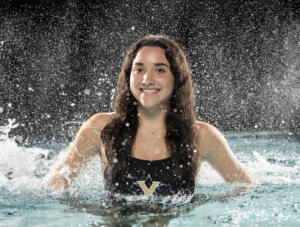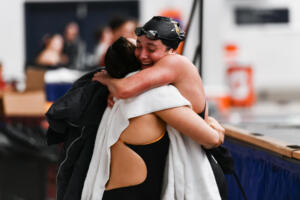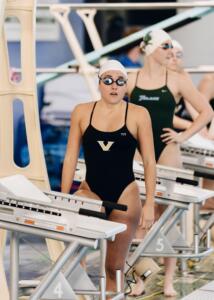Go the Distance
by Graham HaysSwimmer Mercedes Traba’s knack for finishing strong promises to serve her well in the SEC Championships and life beyond the pool
NASHVILLE, Tenn. — Mercedes Traba felt the twinge of disappointment as she climbed out of the pool following her morning heat in the 500 freestyle during the 2024 SEC Championships.
 A grueling mix of distance and speed, the 500 was her best event. And in the biggest meet for any SEC swimmer, she thought it was her most likely path to reaching one of the evening finals—a goal she’d held since she arrived in Nashville three years earlier. Missing out by less than four seconds was an unforgiving return on a season’s worth of pre-dawn alarms, bleary-eyed walks to the pool and endless practice laps.
A grueling mix of distance and speed, the 500 was her best event. And in the biggest meet for any SEC swimmer, she thought it was her most likely path to reaching one of the evening finals—a goal she’d held since she arrived in Nashville three years earlier. Missing out by less than four seconds was an unforgiving return on a season’s worth of pre-dawn alarms, bleary-eyed walks to the pool and endless practice laps.
She could have wallowed. Ever the distance swimmer, she finished strong. A day later, and somewhat to her own surprise, Traba achieved her longtime goal by reaching the final in the 400 individual medley. She set a school record to reach the final—then broke it again in the evening race against some of the best swimmers in college swimming’s best conference.
“I dove in, and I feel like it was just reframing the mindset from the 500 and harnessing the energy of knowing it’s a new day,” Traba said. “I told myself to give it my everything.”
Traba never set out to specialize in swimming’s endurance events. She wasn’t even sure she would be able to finish the races youth coaches steered her toward. Soon enough, she discovered the satisfaction in seeing things through. At Vanderbilt, it helped her persevere and rediscover misplaced joy. And as she works toward a master’s in child development, it leaves her determined to help the next generation find their own reasons to go the distance.
“I’ve had to remind myself that I’m not retired yet, I still need to put focus into swimming because I want to end the season on a high note,” Traba said. “When you have one foot already in your future, you’re so focused on life after swimming. I’ve had that on my mind since the end of my sophomore year. Now that it’s so close, it’s hard to concentrate in the same way on swimming. Honestly, I’ve struggled with that. But every day, I try to take it all in and realize this might be the last time I get to do these things. I try to revel in those moments. I want to embrace that this chapter is coming to a close and enjoy it.”

Mercedes Traba celebrates after advancing to the 400 IM final during the 2024 SEC Championships (Elaina Eichorn/Vanderbilt Athletics).
Finding Her Passion
Traba is far from the only kid whose parents brought her along to hear the symphony. Nor is she the only kid who ever accompanied her parents to work. She is, however, in the distinct minority for whom those trips were one and the same.
Betsy and Fernando Traba are longtime members of the Sarasota Orchestra, Florida’s oldest continuing symphony orchestra. In middle school, their youngest daughter would walk to the nearby symphony hall when classes let out and wait for her parents to finish rehearsal. The music and musicians were her babysitters. She grew accustomed to seeing her mom and dad—on the flute and bassoon, respectively—perform in front of crowds.
She played the violin (whether taking up a string instrument in a wind family was some form of subtle rebellion remains up for debate) and loved theater. When the time came for her to choose between two notoriously time-consuming paths, swimming only narrowly won out over the arts. But even trading stages for natatoriums, growing up around people who pursued their passion to its highest levels helped shape her world view.
“My mom always says that the dedication to practice and the hours you put in perfecting your craft is the same whether it’s swimming or playing the flute or bassoon,” Traba said
She saw her parents live that commitment with her and her elder sister, all the more after coaches with a local swim club told them that their girls had the potential to turn swimming into college scholarships. It might be midnight by the time her parents returned home from a performance. The next morning, her dad would be in the car by 4:45 to take Isabel Traba to her swim practice (Isabel went on to swim for Miami [Fla.]). Mercedes and her mom would follow not much more than an hour later for another practice.
“If you think about where I get a work ethic, I would honestly say it comes from them,” Traba said. “They had to sacrifice a lot to raise two Division I athletes because swimming is not a kind sport to those who have children in it.”
The Distance Life
Traba and her sister started swimming for decidedly pragmatic reasons—their mom enrolled them in classes after realizing that an invitation to a birthday pool party was likely to be the first of many living in Florida. By the time Isabel turned 5, she was part of a competitive swimming club. Mercedes followed soon after her fifth birthday.
She didn’t exactly take to it like, well, like a duck to water. Less naturally gifted than her sister, at least by her own estimation, she still gravitated more toward music and theater activities. But as much as the little sister emulated her big sister, following in her footsteps in everything from swimming to violin, she also competed with her. When she saw her sister succeed, she wanted to get in on the action. Swimming happened to be the medium.
“She taught me how to be competitive,” Traba said of her sister. “You can be this nice, kind person on the outside, but once you get in the water, that’s your time to unleash everything. She taught me that, and I interpreted it in my own way and put it into my own style.”
 She also found her own lane in the events she swam. While her sister specialized in shorter sprints, Traba has long focused on middle and longer distances. The distance life chose her, as she puts it. And she went far from willingly. She recalls throwing a fit around age 12 when her mom told her that coaches wanted her to race in the 500 free. She didn’t think she could finish a race that long—so long that her sister had to stand at the far end of the pool and count laps lest she lose track in the water. She remembers waiting to enter the water while a slightly overwrought inner monologue debated whether she would survive.
She also found her own lane in the events she swam. While her sister specialized in shorter sprints, Traba has long focused on middle and longer distances. The distance life chose her, as she puts it. And she went far from willingly. She recalls throwing a fit around age 12 when her mom told her that coaches wanted her to race in the 500 free. She didn’t think she could finish a race that long—so long that her sister had to stand at the far end of the pool and count laps lest she lose track in the water. She remembers waiting to enter the water while a slightly overwrought inner monologue debated whether she would survive.
She survived. As it turns out, she was rather good. These days, she regularly swims the 500 and 1,000 free and also ranks in the program’s all-time top 10 in the 1,650 free, the longest individual race in NCAA swimming. She still isn’t likely to swim a mile for the fun of it when she finishes at Vanderbilt, certainly not in 17 or 18 minutes. But if “fun” isn’t the right word, there is something deeply satisfying about the latter stages of a long race.
“These people are going to go out super-fast, but I know I can back-half them—I can catch them in the end,” Traba explained. “When you’re building through the second 500 in the 1,000 and you see yourself passing people, honestly, that gives you the energy you need to finish the race hard.”
On Her Own Terms
It wasn’t always clear that Traba would still be in the pool for the “back half” of her career.
Her youth club was intense, the sort of competitive environment that produced Olympians. Coaches told the swimmers that compared to what they went through in practice, races would be easy. To this day, she’s grateful for the opportunities those experiences made possible. She still loves the people she was with. But by the time she was a senior in high school, she was also burned out and struggling with anxiety and depression.
Just as she once feared losing count of the laps as a race churned on, she lost track of her purpose in swimming—and with it some part of her identity. And just as her sister once held the lap cards to reorient her, she sought out assistance from a clinical child psychologist.
“At some point, doing the same thing for 14 years, it gets to you,” Traba said. “I needed to work with somebody to help me get out of that mentality of not finding any joy in swimming, just doing it to do it—or doing it to get to college. I needed help realizing I do this for a reason. I joined this sport for a reason.”
Vanderbilt was another turning point. Swimming for a Division I program brought its own anxieties, but where her final swim seasons in high school had crawled by as a painful slog, her first season with head coach Jeremy Organ’s Commodores felt like it was over in the blink of an eye. It wasn’t a struggle to get out of bed knowing what awaited in practice (at least not any more of a struggle than beating the sunrise to the pool normally is). Swimming was an important part of her life at Vanderbilt, but it was one part of a much larger puzzle.
“Coming into a totally new environment, it helped me fall in love with swimming all over again,” Traba said. “Jeremy is so welcoming and understanding. He recognizes you as a person rather than just an athlete.”
View this post on Instagram
Embracing a holistic attitude didn’t hinder her athletic development; it supercharged it. She set a program freshman record in the 400 IM at the SEC Championships and recorded the team’s best times that season in the 500 and 1000 free. And swimming on her own terms, she didn’t stagnate or drift away, either. She kept improving each year, including last year’s SEC final. She’s still at it, lowering her program record in the 500 free earlier this season.
She’s long had an interest in working with children. General chemistry convinced her that medical school might not be for her, but her experiences working with a psychologist as an athlete opened a new door for her academic interests. While completing her undergraduate degree in child development studies, she’s able to get an early start on graduate studies through Peabody College’s child studies master’s program.
“I want to be able to help kids the way that someone helped me fall in love with my sport again,” Traba said. “It was one thing to talk to a clinical child psychologist about it, but it’s another thing to talk to a clinical child psychologist who has been through it. Even here, it’s one thing to talk to a sports psychologist, but it’s another thing when they’ve been a Division I athlete and experienced the ups and downs of sports.”

Mercedes Traba is honored by Vice Chancellor Candice Storey Lee and the swimming coaching staff prior to her final home meet. Isabel Traba is pictured holding flowers (Vanderbilt Athletics).
She was raised with an appreciation for the commitment necessary to transform a passion into something more. She grew to savor the satisfaction of seeing a challenge through. She learned that getting to finish line only matters if you understand why you started the race.
Now, she wants to share what she’s learned.
And as she nears the wall for the final time as a Commodore, she’s just getting started.

